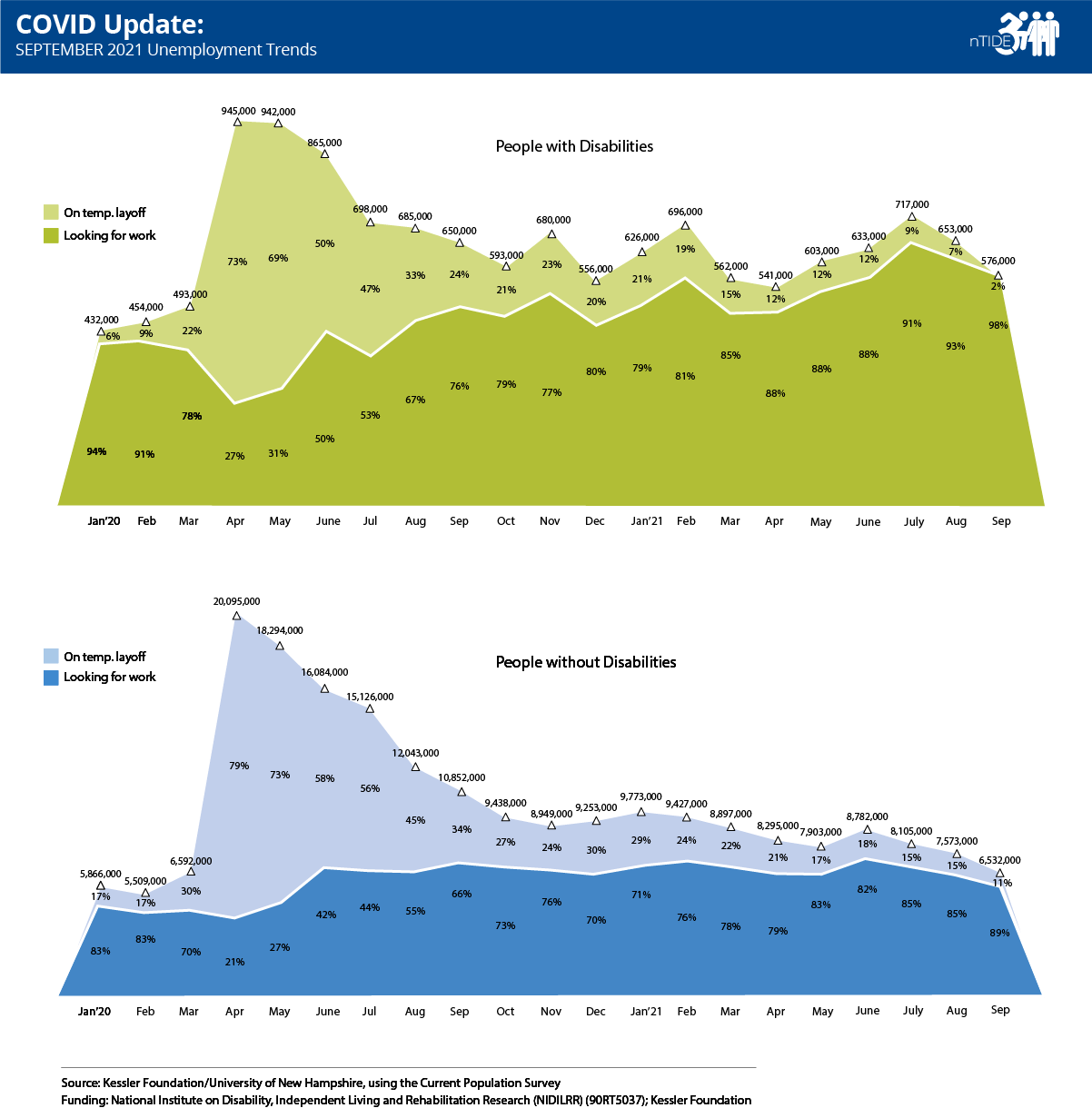nTIDE September 2021 COVID Update: Unemployment declines for second consecutive month
National Trends in Disability Employment (nTIDE) – issued semi-monthly by Kessler Foundation and the University of New Hampshire
East Hanover, NJ. October 25, 2021. For the second consecutive month, unemployment declined for people with and without disabilities, according to today’s National Trends in Disability Employment (nTIDE) COVID Update. While this is a positive sign, experts caution that further improvements are needed to define a downward trend.
In April of 2020, restrictions on economic activity in the U.S. due to the COVID-19 pandemic precipitated an unprecedented rise in furloughs and people looking for work, prompting the addition of this mid-month nTIDE COVID Update. The mid-month nTIDE follows two key unemployment indicators – furloughs, or temporary layoffs, and the number of people looking for work, comparing trends for people with and without disabilities.
Although September’s nTIDE COVID Update graphic shows lower unemployment, levels are still higher than pre-pandemic levels for both groups,” noted nTIDE co-author Andrew Houtenville, PhD, professor of economics at the University of New Hampshire (UNH) and research director of the UNH Institute on Disability. “It remains unclear whether these chronic elevations constitute a ‘new normal,’ or a phase that will be followed by more substantial recovery. There will be multiple factors at play over the coming months, including the ongoing vaccination campaign and new recommendations for booster doses.”
“However, the graphic also shows that people with disabilities are looking for work at rates higher than before the pandemic,” Dr. Houtenville continued. “They are striving to work in greater numbers, most likely motivated by the opportunities in the evolving labor market, as well as the need to provide for themselves and their families.”

This graphic compares the impact of the COVID-19 pandemic on people with and without disabilities, capturing pre-pandemic and current unemployment data from January 2020 to September 2021. Unemployment for people with and without disabilities declined for the second consecutive month, as economic activity increased, but levels of unemployment remain above pre-pandemic levels.
Notes from the Field
As the economy recovers, there’s evidence that some employers scrambling to fill job openings are reaching out to jobseekers with disabilities. “Some of our nonprofit grantees that transition people with disabilities to the workplace are being inundated with requests for qualified candidates,” reported Elaine E. Katz, MS, CCC-SLP, senior vice president of Grants and Communications at Kessler Foundation. “People with disabilities have been resilient in their response to the economic upheaval caused by the COVID-19 pandemic,” she noted. “To help them succeed, disability service providers need support in order to help them take advantage of opportunities in the rapidly changing job market.”
Disability employment expert John O’Neill, PhD , provided an update on JobPathNYC, a New York City-based nonprofit that provides customized employment services for people with intellectual and developmental disabilities. Dr. O’Neill, director of the Center for Employment and Disability Research at Kessler Foundation and co-author of nTIDE, noted changing attitudes among families, who are becoming more comfortable with their family members with disabilities returning to work. “Customized jobs, however, require organizational supports that are not yet feasible for many employers” he added.
Each nTIDE release is followed by an nTIDE Lunch & Learn webinar at 12:00 pm Eastern.
Register for next month’s nTIDE webinars: November 5, 2021, nTIDE Jobs Report, and our November 19, 2021, nTIDE COVID Update at https://researchondisability.org/home/ntide. You may also view the nTIDE archives at this site.
This COVID Update is an extra edition of National Trends in Disability Employment (nTIDE), a joint project of Kessler Foundation and the University of New Hampshire Institute on Disability, co-authored by Dr. Houtenville and John O'Neill, PhD, of Kessler Foundation. The nTIDE team closely monitors the job numbers, issuing semi-monthly nTIDE reports, as the labor market continues to reflect the many challenges of the pandemic.
Funding: Kessler Foundation and the National Institute on Disability, Independent Living and Rehabilitation Research (NIDILRR) (90RT5037)
About Kessler Foundation
Kessler Foundation, a major nonprofit organization in the field of disability, is a global leader in rehabilitation research that seeks to improve cognition, mobility, and long-term outcomes -- including employment -- for people with neurological disabilities caused by diseases and injuries of the brain and spinal cord. Kessler Foundation leads the nation in funding innovative programs that expand opportunities for employment for people with disabilities.
About the Institute on Disability at the University of New Hampshire
The Institute on Disability (IOD) at the University of New Hampshire (UNH) was established in 1987 to provide a coherent university-based focus for the improvement of knowledge, policies, and practices related to the lives of persons with disabilities and their families. For information on the NIDILRR-funded Employment Policy and Measurement Rehabilitation Research and Training Center, visit ResearchonDisability.org.